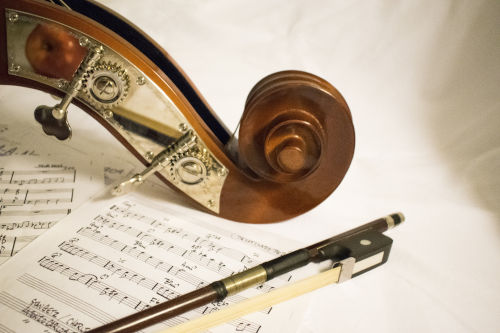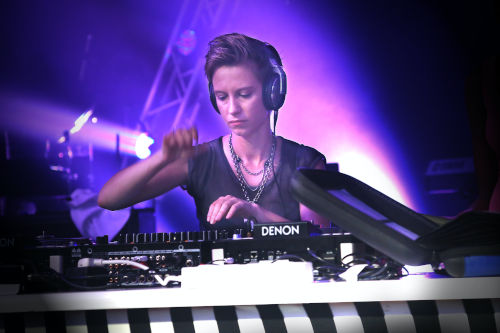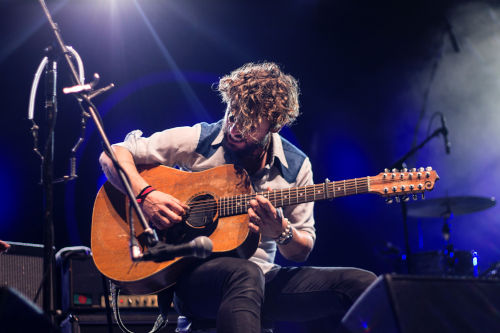Music Copyright
Fact sheet P-07
Issued: 30th June 2004 Last amended: 27th March 2023
Fact sheet P-07: Music copyright
 How copyright exists in music
How copyright exists in music
There are principally 2 areas to consider when we talk about music copyright:
Copyright ©
The traditional ©, ‘C in a circle’, copyright applies to the composition, musical score, lyrics, as well as any artwork or cover designs.
All of these elements are subject to copyright from the date of creation until the expiry specified in your national legislation, typically some years after the death of the writer/composer, (e.g. under UK law 70 years after the end of the calendar year in which the last author of the work died).
Phonographic rights ℗
Phonographic rights are a specific type of copyright that applies to the sound recording itself; also referred to as phonorecord, phonogram or just sound recording rights, depending on jurisdiction.
As anyone who has ever been in a recording studio knows, crafting a production-ready sound recording takes considerable effort, skill and mastery of audio technology. Even something as simple as where a microphone is placed can make a huge difference to the end result and a good sound engineer will have spent years perfecting their craft. Phonographic or sound recording copyright exists to reflect that this act of creation is separate to the creation of the underlying music being recorded.
Phonographic rights typically have a shorter lifespan than the copyright in the underlying work, though duration does vary from one country to another depending on national laws. Under UK law, it will run for 70 years from the date of first release/publication, (or 50 years from the year of recording if not released during the 50 years).How does this work in practice?
Suppose you want to record and sell your own version of Tchaikovsky’s 1812 Overture. This would not present a problem as Tchaikovsky has certainly been dead for over 70 years, so the work would now be out of copyright and in the public domain. Provided you performed and recorded the work yourself, no infringement would have occurred.
You would, however, be justifiably annoyed if someone else simply copied your recording and started selling it themselves. This is where the copyright in the sound recording comes into play. Even though the underlying work is now out of copyright, your sound recording is still subject to copyright protection and so the sale of your work without permission would typically constitute an infringement of your copyright and something you can take action to stop.
 Using the work of others
Using the work of others
If you use samples of music by other writers and composers in your work, ensure that you get permission to use those samples before you attempt to publish or sell your work. Similarly, if you use loops or samples available via sample collections etc., ensure that these are licensed as free to use, or obtain permission first.
Obtaining permission
If you need to get permission to use a piece of music, normally the best place to start is with the last known publisher for the work. They should know who you need to contact for permission and, in many cases, they will be authorised to act on the owner's behalf in such matters.
If the work is by a US artist, you could also contact the American Society of Composers, Authors and Publishers, BMI (Broadcast Music, Inc), or SESAC.
If the work is by a UK artist, then PRS for Music may be able to help. Band members agreements
Band members agreements
Where music is written as a group effort, we recommend that you draw up an agreement to clarify issues, such as which rights belong to which member, how royalties should be distributed and what happens if members of your group leave.
For successful commercial bands, incorporation is also an option. As with a normal incorporated company, the band members would own shares in the band/company. In this situation, a band member would typically sell their shares to the other band members if they decide to leave.
For more on this topic, see our main article on band agreements.- Does copyright protect a band name?
Copyright does not apply to names in their own right, neither will it apply to single phrases or slogans. It may, however, be possible to apply to have the name regionally protected as a trademark via your national trademark office. To qualify, the name should be distinctive, not deceptive or contrary to law or morality, and not similar to previously registered band names.
It is not uncommon for 2 or more bands to have the same name, though when there is conflict, the less well known one will typically be required via legal action or mutual agreement to change their name to avoid claims of 'passing off'. - Public performance
Clubs and venues will generally be licensed for public performance. Depending on your situation, you may need a licence to perform music or play sound recordings. There are various licensing organisations that licence music and collect royalties on behalf of songwriters and composers throughout the world, including:
- In the UK - PPL PRS.
- In Australia - PPCA, or APRA AMCOS .
- In the United States - ASCAP and SESAC.
- Copyright registration
Registration with the UK Copyright Service is a good way to ensure there is independent evidence of creation and copyright ownership of your music and lyrics. This can be valuable evidence to defend your claim if your music is used without permission or plagiarised, and we would advise registering your music before making it available to non-trusted third parties, such as sharing online or sending it to unknown prospective agents/publishers, etc.
See our fact sheet "P-31: Copyright registration of music, songs and sound recordings" for details.
